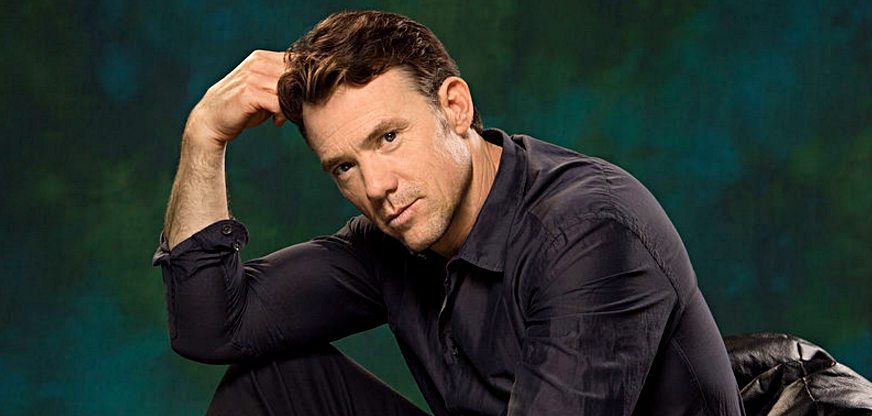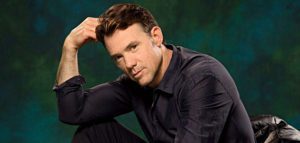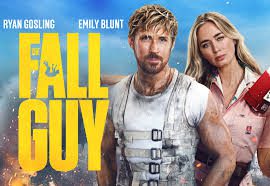Avengers: Infinity War?offers the (penultimate) event of the Avenger universe. When evil overlord, Thanos, threatens to destroy the galaxy in the midst of his hunt for the Infinity Stones, the Avengers must assemble one more time to attempt to save humanity from his violent clutches. Billed as the ?biggest cross-over event in history?, Infinity War?features Iron Man, Black Panther, The Guardians of the Galaxy, Dr. Strange and more as they share the screen for the first time. However, given the film?s emphasis on special effects and CGI work, there are many people essential to the film that you many not immediately recognize onscreen.
One such actor is performance capture artist, Terry Notary, who plays both Teenage Groot and child of Thanos, Cull Obsidian, in the film. A veteran movement coach, Notary affirms that taking on roles such as these are an incredibly emotional experience that cause the actor to explore the deepest parts of themselves.
?I was in Cirque du Soleil for five years but I was a gymnast at UCLA before that,? he recalls. ?I learned this technique of gymnastics, but it wasn’t until I joined the Cirque that I learned how to perform? and what I try to do is take a lot of the same principles that we used at Cirque creating characters and build upon those with techniques that I’ve learned. There’s a sort of balance between the technical aspects of things versus the emotional and everyone has their own emotional blueprint. Everyone is different. Basically, your life is a blueprint of your body is a blueprint of your life. It is a reflection of everything that you’ve been through: all your past traumas, your experiences, your successes, your identity, your sense of self, or who are you, When you have an experience, it marries itself into you. Basically, the work that I do is not movement it but really it’s about life and learning about who you are.?
?What I do, if we start sitting in a chair, is a lot of the sort of Alexander work and I can sort of get a sense of the blocks, tensions, habits that are sort of innate the person. Then, we can start to work through those and identify with what they are, the emotions behind those things so that we become a blank slate.?
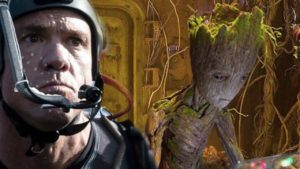 With this in mind, Notary recognizes that one of the chief obstacles to an actor’s performance consists of one?s own fear. Still, he also believes that, once we embrace it, fear can also be a powerful motivator.
With this in mind, Notary recognizes that one of the chief obstacles to an actor’s performance consists of one?s own fear. Still, he also believes that, once we embrace it, fear can also be a powerful motivator.
?People think [they] shouldn’t feel afraid at all, but that’s was quite the opposite,? he explains. ?[Whether] you’re an actor, acrobat or athlete, it’s all the same. You have to embrace the fear and, when you embrace it, then you extinguish its power and you can use it as a fuel to propel you into action. You can use fear to widen your peripheral, sharpen your senses, listen, hear, feel and become more alive. Basically, when you fight fear, you empower it and, and it’s the worst enemy of an actor, acrobat or just a normal business person, it doesn’t matter. So, when people think I shouldn’t feel afraid, that’s wrong. Fear is great to have. Fear is energy. Fear is anticipation and the ultimate fuel. When you learn how to stop trying to hide from fear or your real issues, it creates a presence that you have in yourself that is open, aware, vulnerable, and soft with integrity. So, it’s like finding a balance [between] the mind and body.?
For Notary, much of the process of bringing authenticity to his performance comes through one?s ability to relax and open space for creativity instead of pressuring themselves.
?It’s like undoing habitual muscle that’s constantly grabbing [you]. It’s undoing this sort of idea that it needs to be 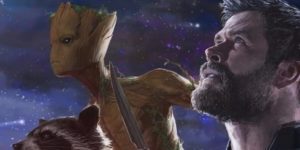 hardworking. We’re trained as human beings that hard work is rewarded. You grimace your face, you tense up where we kind of discouraged [ourselves] from daydreaming and going off into these super creative soft places that are actually more creative and more rewarding. So, it’s kind of like undoing the idea of hard work and embracing the sort of trust that things will unfold in this body in your new state of being that will actually make you more interesting. The mind becomes a guide rather than a boss. You’re actually watching yourself do this and you’re continuing to allow it to happen. That’s the sort of the final step is continuing to allow it to happen and unfold.?
hardworking. We’re trained as human beings that hard work is rewarded. You grimace your face, you tense up where we kind of discouraged [ourselves] from daydreaming and going off into these super creative soft places that are actually more creative and more rewarding. So, it’s kind of like undoing the idea of hard work and embracing the sort of trust that things will unfold in this body in your new state of being that will actually make you more interesting. The mind becomes a guide rather than a boss. You’re actually watching yourself do this and you’re continuing to allow it to happen. That’s the sort of the final step is continuing to allow it to happen and unfold.?
Further, Notary also argues that, part of the process in creating a realistic character stems from one?s ability to recognize the value of mistakes as well.
?I say that we should make tons of mistakes so that we know what it’s not,? he claims. ?In the mistakes, you find little gems and go, ‘Whoa, that’s amazing. What did I just do?’ Then, you start discovering these things that are screaming out to come out subconsciously and, all of a sudden, you can start to create beautiful moments with those subconscious things that are trying to speak through you.”
In Avengers: Infinity War, Notary has the unique challenge of playing two wildly different characters on screen. As both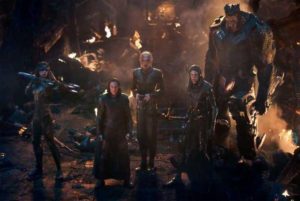 Groot and Cull Obsidian, he found himself discovering, not how to play the roles of both hero and villain, but also creating different mannerisms as well. In the end, however, Notary enjoyed the challenge, seeking to learn something about himself as well.
Groot and Cull Obsidian, he found himself discovering, not how to play the roles of both hero and villain, but also creating different mannerisms as well. In the end, however, Notary enjoyed the challenge, seeking to learn something about himself as well.
?I love working with that? I don’t see it as strange to play these two very different characters. It’s kind of fun,? he says. ?When I put the nametag on for Groot, it’s totally different than when I put the name tag on for Cull Obsidian. They’re totally different creatures. With every character that I play, I try to find something out about myself. I try to always learn about who I am by making the mistakes of the character and trying to figure out who or what it is.?
?Then, I just go on walks on the beach and I’ll just start really tapping into who it is or what it is. For me, Cull had this a voice and intelligence. He had an inner dialogue that was going on. You kind of get a sense that this is not a hulking, brutish crusher without any feeling. He’s actually got a lot of feeling going on, which I think is really fun with that character. Once I found that voice inside, then I had this internal dialogue and I could just be in my own world and play the world, as I thought, through his eyes.?
Given the advancements in both technology and ability in motion capture technology, there has been much discussion in recent years about whether or not these actors should be recognized come awards season. In light of this, Notary feels that, ultimately, the technology does not interfere with the authenticity of the actor?s performance.
?What I tell people when they ask me that question is [that] you should watch the performance without the Ape.,? he contends. ?I had scenes with Andy [Serkis] where I said, ?Holy mama! What was that? Where did that come from?!? then, you know, I don’t even think they can translate some of that goodness yet within these characters. The grading system?or however they decide?should be viewed on the performance, the actual actors with the camera on. Then, they can watch that performance and ?OK, I see it. It’s all on camera. It’s all in the shots. It’s all there. We thought it would be great to just watch the movie with just us in our performance capture suits, because I’m sure it’s really interesting. So, my answer to that is absolutely yes. I think that once people feel that someone’s performance is being tweaked or modified, that it’s not a true performance. But I think when you see the performance in its original state, you would change your mind on that.?
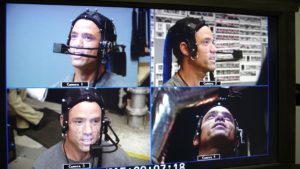 Over the years, Notary has been involved with a number of high profile projects, such as Avatar, The Hobbit, and Planet of the Apes?reboot trilogy. When asked if there has been anyone who particularly mentored him in his process as an actor, he speaks highly of many of the directors with whom he?s had the privilege to work.
Over the years, Notary has been involved with a number of high profile projects, such as Avatar, The Hobbit, and Planet of the Apes?reboot trilogy. When asked if there has been anyone who particularly mentored him in his process as an actor, he speaks highly of many of the directors with whom he?s had the privilege to work.
?When [James] Cameron called me up and said he wanted me to come down and read this script called Avatar, I was honored?,? Notary remembers. ?He?s a great director because he’s really good at pushing people to become the best that they can be. He expects that. He hired me on the spot when we had our conversation after I read the script. [Avatar] was his baby of 10 years that had all this incredible technology and groundbreaking, cutting edge stuff that was going to happen and he trusted me. I went home and I just started doing research, studying tribes and this and that. I just poured myself into it because of his belief in me. He sort of instilled this sort of belief in myself that I could do it and I owe him a lot for that by actually trusting me.?
?It’s the same with Peter Jackson,? he continues. ?I worked with him for two years on the Hobbit?trilogy every day and he became a good friend and a mentor. We jumped on the film and we just liked fixing things together. He became like a mentor to me as well and he’s inspired me to direct my first film. There’s been quite a few. Matt Reeves is another. He’s just been really cool friend and you know, I think it’s about like, like if you’re a musician and you hit the gym with good musicians, you become better.?
Avengers: Infinity War is in theatres now.
For full audio of our amazing conversation with Terry, click here.

